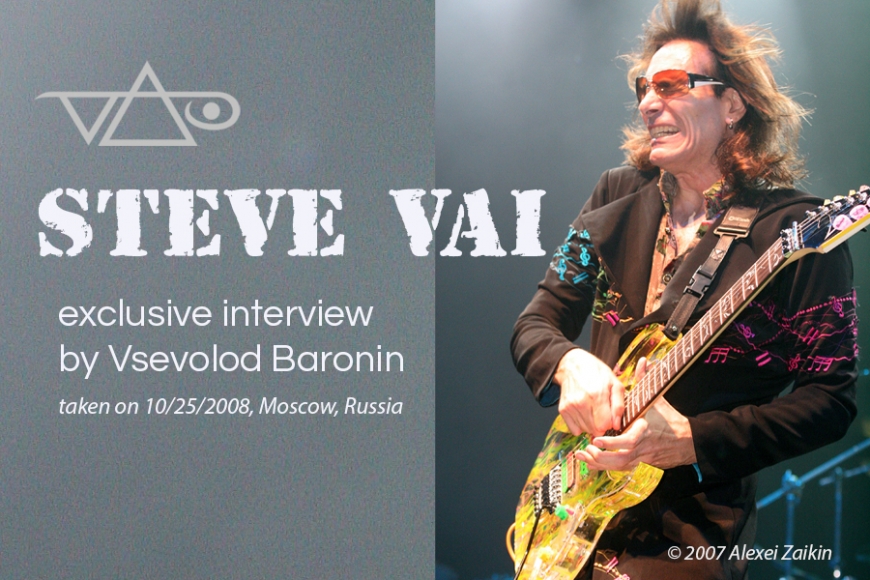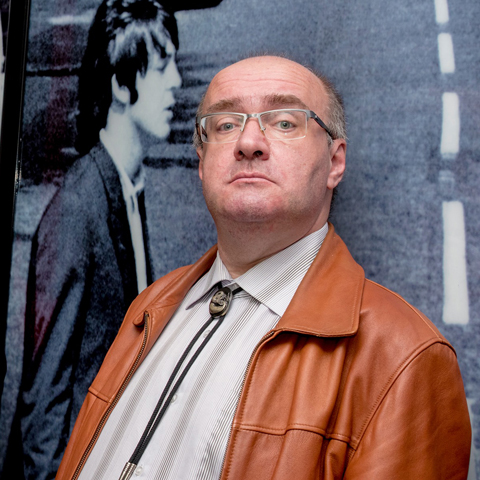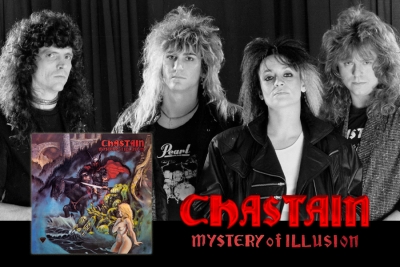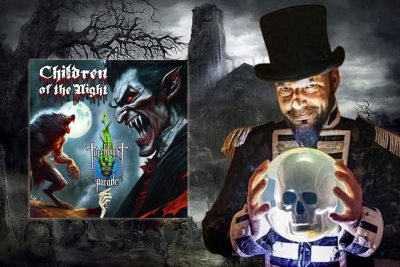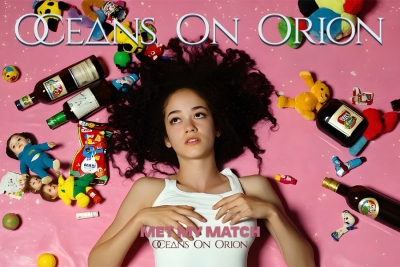VB: Everyone knows very well that Steve Vai's professional career began in Frank Zappa's band, but what preceded your transition to become a professional is rather unknown. How did you get the idea to become a guitarist?
SV: Well, I can't say that there was such an idea at all — I just wanted to play the guitar from the very moment I saw this instrument! I was then six or seven years old, and our neighbor knew how to play the guitar ... But at first, it was very, very difficult for me to learn the guitar: you see, I turned out to be not the very first musician in our family, so already at that tender age I learned to play the accordion. To tell the truth, I hated these lessons, and the guitar somehow didn't work out well at first either.
Soon I started listening to records from the collection of my older sister — the albums of Led Zeppelin, Alice Cooper, Deep Purple — in general, all those records on which there was a heavy guitar sound. That's how I began to try to play the songs of these bands on the guitar with my friend — we were 13 years old then. And my first influence as a musician was my neighbor — a guy a little older than me, but he knew how to play a few Jethro Tull songs on the guitar, and he seemed to me a real magician. It was he who gave me the phone number of his friend Joe Satriani, who lived in Manhattan, who was already giving guitar lessons at that time, and with whom my neighbor studied — and I began to study more or less professionally.
But at first, at 13 years old, I was a very modest and shy student — and Joe was then 16 or 17 years old, and he was already a great musician back then. I'm not kidding — Joe is always great! It is to him that I owe the fact that I became a professional guitarist. So in high school I already had a decent rock band, and at school, of course, we were kings — you know!
But at the same time, I was more interested in the process of writing music than performing cover versions of rock material in front of fellow students — you will not believe it, but as a child I dreamed of becoming a composer and created the first serious work even before I really learned to play the guitar... At that time I thought of myself more as a composer — so I wrote my first symphonic work, studying in the ninth grade. It was called Sweet Little Poor Caroline and was performed by our high school orchestra. After school, I decided to get a serious musical education and entered the Berkeley College of Music, where I became seriously interested in the music of Frank Zappa — I don’t want to say that I was not familiar with his work before, but it was in Berkeley that I began to analyze his compositions in a serious way.
VB: They say that you received an invitation to Frank's band after you transcribed one of his complex compositions into a sheet music notation, and that work fell into his hands...
SV: Yes indeed. I was 18 when I enrolled in Berkeley — that is when I sent Frank a cassette tape of my band's demos, as well as a notation score for one of his super complicated numbers, Black Beach. After that, Frank hired me, as I knew musical notation well, for the role of a notation transcriber for his guitar parts, including solos — he’d send me these recordings, and I’d transfer them to paper. There was no talk of joining Frank's band yet, I was too young — as I said, I had just turned 18 years old. But I was in correspondence with Frank, I was writing down the sheet music for him — and then I moved to California, where my grandpa and grandma lived. It was there when I first came to Frank and his band’s rehearsal, and immediately found myself in it.
VB: Your most quoted statement in the last few years says that nothing was more important to you in childhood and adolescence than playing the guitar, and everything else was just an obstacle to becoming a musician. How true is this quote?
SV: Of course, it's true! When I was just learning to play the guitar, it was everything for me in my life — I was afraid to miss the slightest opportunity to learn some new technique. I was absolutely terrible boyfriend — girls weren't my priority. I could not even communicate with them on the phone — for example, my classmate calls me and says: "Oh, Steve, let's chat!” And I’d reply to her somewhat cocky: “I have no time. I'm practicing the guitar over here!" This is how my life went outside of school — I played the guitar and tried to do it in the best possible way. Playing the guitar was my sacred ritual — for me this process was something like a sanctuary in which I would hide from everyday life.
VB: I understand everything very well — after all, I once played in a school rock band as well...
SV: Well, then you know everything that I am telling you! So, such a life in my youth was quite suitable for me, and I felt like a happy and successful young man, because in school sciences, and in sports — and in any other activity, besides music — in those years, success did not haunt me at all... But even then I understood perfectly well that I could make a living with music, and a very good living. Even if I would became just a guitar teacher, I would not live in poverty. After all, I taught a little guitar — and I can’t say that I was paid a lot, from five to 12 dollars an hour — but I felt absolutely happy and understood that even with this money I would fully support myself.
Of course, there are many careers in rock music: you can become a famous and rich musician, but this is a completely different story, but even then you need to be extremely honest in what you do. After all, when you realize that you are doing something much better than others, then it turns out that it is because of this fact that people noticing you. This is how I am: they know me precisely for what I do in the best possible way, and all my success, my worldwide fame is a kind of side dish for the main course, or, if you like, my prize points, my bonuses.
I have always written and played my own music and I have always been absolutely satisfied with the process. Everything else in my life just happened by itself. I did not devote a single day in my life to the struggle for my career in show business simply because I did not think about it and did not care. I do not argue — it happened that others fought for me, for my career, but this had nothing to do with my life path.
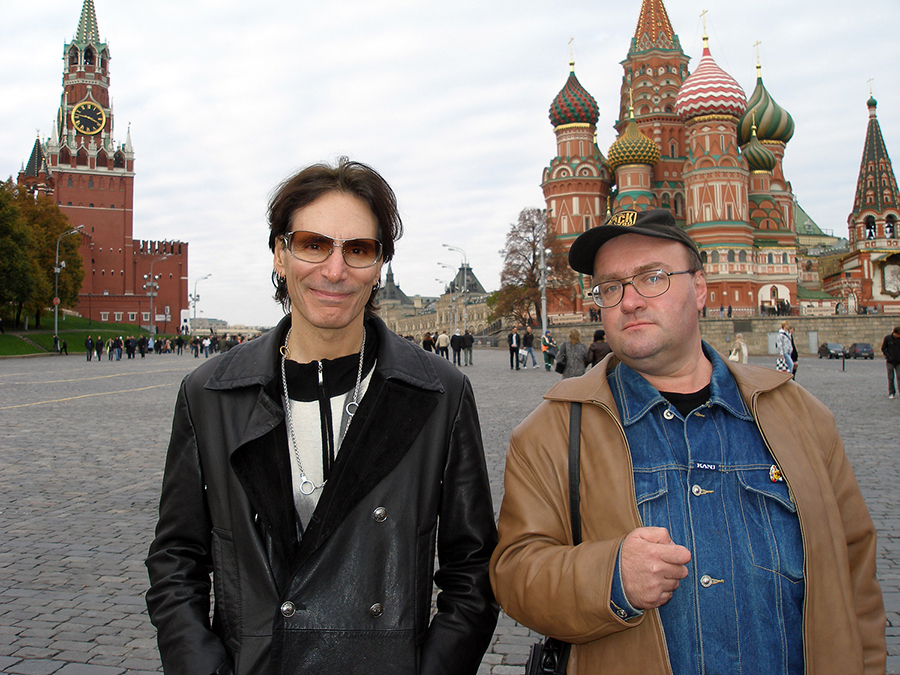 Steve Vai with Vsevolod Baronin on the Red Square in Moscow, Russia.
Steve Vai with Vsevolod Baronin on the Red Square in Moscow, Russia.
VB: How did you manage, being a relatively unknown musician, to get into the band of the ex-Van Halen singer David Lee Roth?
SV: After leaving Van Halen, David envisioned such a line-up so to downright remove his former colleagues into oblivion. The first person David hired to join his band was bass player Billy Sheehan, and at that moment the specialized press was just starting to pay attention to me: I had already worked with Frank Zappa, and just released the solo album Flex-Able on my own, which included recording of the track called Attitude Song — an absolutely unique piece in terms of guitar playing.
So Billy recommended me to David: well, that it does worth to listen to this guy... I came to the rehearsal and, as you already understood, after that David stopped looking for a guitarist. Playing with Dave in the 80s was great: the band's material suited me perfectly, and I felt like I was in a completely fantastic world. We had the largest lighting stage design in the world — this is an absolutely officially published record, and all the wild stories that happened to us on tours were just an addition to all this musical and lighting splendor.
VB: There is an opinion that at that time David just wanted to find a guitarist who could play at least not worse and maybe even better than Eddie Van Halen...
SV: Yes, of course! And as I understand now, he did not need an Eddie’s clone in terms of sound — really, he was looking for a virtuoso guitarist, somewhat similar to Randy Rhoads or Yngwie Malmsteen, who would also look great on stage. But we, in fact, were in those years a great band, our concert work was simply incredible. And this is understandable: Gregg Bissonet is an absolutely incredible drummer, and how can someone who is the most sought-after and most professional studio drummer in the world be another musician? Well, and Billy Sheehan ... it's just Billy, not only a great bass player, but also a great buddy! I want to honestly say that touring with David's album Eat ‘Em And Smile (1985) is the most fun and incredible experience for me in the world of rock and roll that I have had.
VB: And how was it for you working with Graham Bonnet's band Alcatrazz?
SV: First, I will try to explain why in those days I joined such bands, which was perhaps too straightforward from the point of view of my own guitar playing. The fact is that I am always attracted by such musical adventures — I am really interested in what I can do in the rather conservative world of vocal hard rock. This was the case with David Lee Roth, and with Alcatrazz, and with Whitesnake...
Frankly, I was not only interested in trying myself as a rock guitarist — I know perfectly well that as an instrumentalist I am excellent and can play, probably, any guitar part... Besides, I was wondering what I could do so new and different in traditional hard rock. My experience with Frank, David, and even with Whitesnake was sometimes sheer madness — but it was very interesting! However, it was not easy to work with Alcatrazz — after all, I came to Yngwie Malmsteen's place, and the audience was waiting to hear another super-fast hard rock guitarist, not inclined to experiment.
Still, the Alcatrazz album Disturbing The Peace (1985) with my participation turned out to be a very popular work, which was well received by my solo albums fans — because it sounds great, and with my guitar playing I tried to bring something new to such straightforward hard rock. On top of that, I worked really well with Graham and we are still friends today. It was very easy to write songs with him — not only is he a very talented singer, he is a real gentleman. If you give a boost to the ideas that he generates while writing songs in the right direction — and at least come up with some sensible guitar riff — at this point he becomes an incredibly productive and original composer.
I don’t want to praise myself too much, but still the subsequent works of Alcatrazz and Graham's solo albums turned out to be somewhat banal, he shifted towards a little simplified bluesy hard rock. Well, this is my opinion... But as it seems to me, Disturbing The Peace was a hugely underestimated work simply because the critics and the public did not know what label to put on it. Most of them thought with a straight face than it was just another heavy metal album and nothing more. And he was compared — funny to say — with the newest works of bands like Rough Cutt or W.A.S.P., that is, with the most fashionable mainstream metalheads at that time!
VB: Well, now Alcatrazz would hardly be called a heavy metal band — rather it would be classified as traditional hard rock...
SV: Yes, times are changing — after all, in the mid-80s the very term heavy metal meant completely different from what it is now. Now, heavy metal means all these noisy bands in which musicians play seven-string guitars with a low tuning — and no one could fantasize this more than 20 years ago. I don't really know much about modern heavy metal, and from all this kind of intense music I see only the group called Meshuggah as a real standout band. And, of course, Devin Townsend. Honestly, David is an unrecognized genius.
VB: I completely agree with that.
SV: If I don’t understand other musicians from the world of heavy metal very well, and I even ask myself sometimes: what’s going on in their heads? — then Devin is the best heavy rocker I have ever known and heard. When I listen to his next work, I always think that the work of all other heavy bands and solo artists is very dull and uninteresting in comparison with his material. Devin always offers extraordinary musical ideas, and they turn out to be like products of a tortured soul and consciousness. His musical vision is truly apocalyptic, and his material is of that rare kind in modern rock music that can move me to creativity. We can always say about Devin that he composes and plays music that does not yet exist in reality — it seemed to come from science fiction novels or even from other worlds.
VB: But after all, it was you who happened to become the discoverer of Devin's talents...
SV: Yes, I don’t argue with that. But when Devin worked with me, he looked like a very bright bird, enclosed in a cage too small for him. Simply because I expected from him the realization of my own musical ideas. I wouldn’t give him the freedom to become the Devin Townsend that everyone now knows from Strapping Young Lad and his “solo” bands, but I want to point out that he did a brilliant job in our Vai band. It is also surprising because Devin was very young when we started working together — he was not even 18 years old. I cannot find other words, and therefore I will simply say: Devin is a god. He is a real genius who writes music, listening to which, you need to be prepared for the unexpected in every bar. His material does not let the listener get bored or relaxed. He knows how to combine pieces of music in a variety of styles, enclose them in his own spaceship and send them into outer space! And besides, he has an incredible sense of humor — this is very strongly felt in his music. To be honest, every day spent in Devin's company is a real adventure.
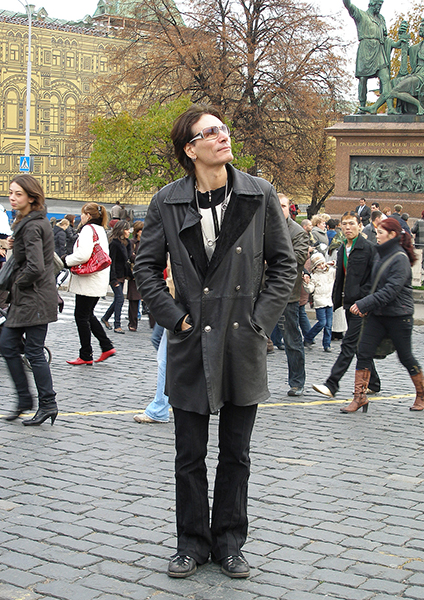 Steve Vai on the Red Square in Moscow, Russia.
Steve Vai on the Red Square in Moscow, Russia.
VB: However, let's go back to the 80s. Some experts say that the 80s was the musical era when redundancy reigned in rock music — however, it was the virtuoso guitarist who became the most important figure in rock of that decade. Why do you think the guitarists turned out to be the number one rockers then?
SV: Well, there were a lot of reasons for this phenomenon, but I will try to answer the question in a very unexpected, I would even say scandalous way. You see, for every decade of rock and roll, for every genre of music, musicians and their listeners preferred the use a particular drug that prevailed in that particular decade. Let's take the 50s — this was the era of rock and roll, and there were no popular drugs then, they were the subject of artistic bohemians, and only alcohol is uniquely related to the then rock and roll.
Perhaps I will express it vaguely and inaccurately, but in the music of that time there was a kind of alcoholic swing ... In the 60s, psychedelic rock ruled, and its fans used LSD — well, the music was, as you understand, a kind of viscous and surrealistic. In the 70s, marijuana was a popular drug — that's from marijuana all progressive rock turned out, and then what was called “thinking man’s heavy metal”. Probably, if I were a practicing musician in those days, I would also smoke weed — after all, when I listened to Led Zeppelin, Queen and Jethro Tull, I could definitely smell marijuana!
Well, in the 80s, cocaine turned out to be the main drug — in a sense, it upset people who used it in the past; just like LSD — and along the way it helped to reveal the bright, but not always attractive sides of the personality. Cocaine was a drug that brought out the extroverted side of their personality in such people. It colored the world around it, it made the musicians play loud, it made people feel like they were moving on four legs, or something like that! The music of the 80s reminds me very much of cocaine: not all rock of the 80s was good — well, as cocaine is bad for health — but it was bright and loud.
David Lee Roth's band that I played with at the time was a great example of this “cocaine music”. As you can imagine, neither we nor other musicians of that decade tried to match the great bands of the past like Deep Purple or Led Zeppelin, capable of long improvised jam sessions and composing what I call “rich music”. Our music and concerts were like an explosion: loud, bright and with great attention by the musicians to the visual side of the show. The same approach characterized the guitar playing of those days — and I was no exception: I do not argue, I had to play with David also quite serious material, but most of the time on stage we were just “doing the show”. And I can't say it was that bad. If a guitarist is forced to be a showman, then he surely knew how to play!
But then the 90s came and, unfortunately, heroin became the main drug — all the music of the 90s sounds as if it was invented and recorded under large doses of heroin. At the same time, it seems to be telling how the person who created it feels bad in the world around him — this music does not tell anything at all about the musician who wrote it...
VB: And one more question about the music of the 80s. Wasn't all that heyday of commercial heavy metal and similar music just a reaction to the political global climate of the time? Everyone lived with a premonition of the Third World War, no one wanted to die — and everyone wanted to have enough rock and roll fun at the last moment?
SV: While living and playing rock and roll at that time in America, I absolutely disagree with you! American youth did not want to think about such serious things. Neither the generation of my listeners, nor my generation have ever faced anything catastrophic in America, and our government has not pursued any repressive policy against us, has not forbidding us anything.
I believe that it was in the 80s that my generation learned and explored the true freedom of our American society. We have never felt the slightest political opposition to ourselves in any area of life. Well, yes, we could have disagreements with the police about the use of strong words, but no more! We, Americans, then lived in a completely different world than the peoples of Russia and Eastern Europe, where the change of government and political system at the turn of the 90s took place so radically.
In America, no one even thought that at least 15 wars are going on in the world at any time — I admit that these facts are much closer to Russians, because your country directly experienced World War II. In America, no one thought about such things until September 11, 2001, when the war literally came to our home. And it was then that we realized what impact the war has on the economy of America itself, on the economy of the whole world, and, of course, on everyday life. Now we began to think about who our leaders are and how the decisions they make affect the fate of America and the world. We began to control them more. And in the 80s, my generation, and people a little older, simply did not think about it. We just trusted the leaders of America — that's all. Other, more serious thoughts came to us only with our own bitter experience...
VB: Don't you think that the 90s were the first decade when western musicians started to sing not about external problems, but about their own?
SV: Yes, the songs of the 90s sounded like their authors looked at themselves in the mirror for the first time. It's so easy to analyze your personality and write songs on the theme “ Aaah, I'm so unhappy, I'm so fucked up, help me!” They seemed to be talking about their own plight in order for the whole world to come running and help them! In fact, they did not need any help, and in real life they did not accept it, and all these musicians wanted was to be so unhappy and tell everyone about their misfortunes. I cannot deny them honesty — they created music around their gloomy vision of the world, so their music turned out to be so dark. Perhaps in this they were somewhat similar to some of the musicians of the 70s.
VB: For me, the 70s, especially their first half, were the romantic era in rock music...
SV: Yes, in the 70s rock was romantic, and in the 80s all songs revolved around sex! No, I'll tell you straight — around the banging! Even now there is no such thing — I listen to the bands that my children listen to, and I can say one thing — now even many nu-metal bands have softer lyrics, and even funnier. And in the 80s ... For some American bands performing AOR and arena rock, the romance in the lyrics somehow balanced the banging theme, but this was rare. And, perhaps, I am too one-sided in my judgments, but I want to feel sorry for everyone, including my children, whose childhood did not coincide with the heyday of rock music in the 70s. Perhaps I say this because I know for myself that 70s music is simply the best. True, I try to accustom my children to that music and I play Queen or Jethro Tull for them, and they answer me: “Cool, but it sounds too outdated!”
VB: But even in the 70s any loud music was perceived as a “song about fuck”!
SV: And what is surprising here — it is genetically embedded in us, embedded in our DNA: almost everything we do in this life is aimed at meeting a person of the opposite sex and dragging them into bed!
VB: There was one amazing moment in your biography, which is not very well known, not only to the more or less general public, but even to many admirers of your talent. We are talking about the once planned collaboration with Ozzy Osbourne, which was supposed to be finalized with the release of an album of some completely new project...
SV: Yes, when I was on a European tour in 1993, opening for Aerosmith concerts with my band Vai, Ozzy and Sharon came to one of my shows. It turned out that this was not an accident — for several months they had been hatching the idea of not how to make me the guitarist of the Ozzy band: they understood that I was too big for this, but to create a joint project. It turned out that Ozzy really liked Vai's Sex And Religion album and wanted to work with me.
When my tour was over, I went — as we agreed with Ozzy — to the Sony Music rehearsal studio in New York, where I discovered bassist Bob Daisley and drummer Dean Castronovo, and together with Ozzy I began writing material for a project called X-Ray... I didn't have any problems working with Ozzy. We wrote and recorded demo versions of about 15 songs. But the main problem was that someone — obviously Sharon — really wanted the X-Ray album to be a kind of reproduction of Ozzy's first two works with Randy Rhoads. Of course, I'm a guitarist with a completely different education and taste from the late Randy, and I write music a little differently.
Nevertheless, the songwriting process was very interesting and fruitful — and even more so for me: the material turned out to be very heavy in sound, and not very similar to my solo albums or works with other artists. My guitar was tuned in C and I used an octave divider when recording demo tapes. It was a pleasure working with Ozzy. He is one of the most unique, interesting and amazing people I have ever met in my life. Working with him gave me a feeling of amazing creative freshness — those three months that we worked together will remain in my memory forever.
VB: Why did the work on this project end up with nothing?
SV: I heard that Sony Music top executives had decided that Ozzy had to finish recording the new album, which eventually became Ozzmosis — by the time he started working with me, as it turned out, they already had about half of the material ready. At the same time, producer Michael Bienhorn, who recorded Ozzmosis, for some reason was completely uninterested in working with me. Bob Daisley told me a few years ago that at some point Sony Music considered our project unpromising and simply canceled its funding. Honestly, I can't believe it — to cancel work on a project with the participation of two such commercially successful artists as Ozzy and, should I say immodestly, myself!
VB: Is there a chance that sooner or later we will hear these demos of your collaboration with Ozzy?
SV: Perhaps I should not be asked about this. All the demo tapes were at Sharon's disposal, and you probably know very well what kind of woman she is...
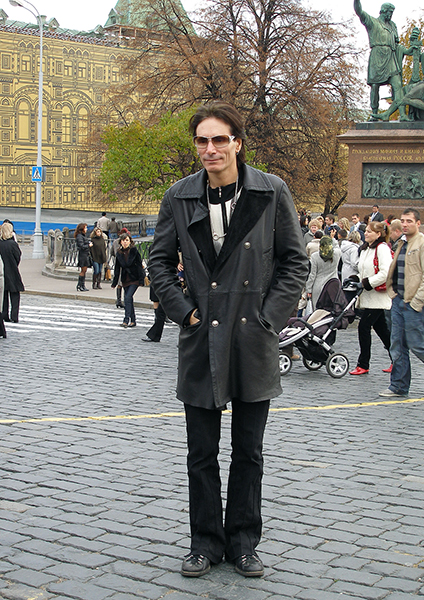 Steve Vai on the Red Square in Moscow, Russia.
Steve Vai on the Red Square in Moscow, Russia.
VB: When can we hear your new solo album?
SV: At the moment (2008) I am working on a DVD, which was filmed in Minneapolis during that short tour in America and Europe, during which we came to Moscow. And only after the full readiness of this DVD I do plan to start working on a new studio album — so, really, you shouldn't expect any new material from me until the end of 2010. That's for sure!
VB: Would this work be a continuation or, more precisely, the next part of the album Real Illusions: Reflections?
SV: I can definitely say no. The next album will be recorded with the current line-up of my group and will be, so to speak, a kind of band test in the studio. During the tour, I have already checked these musicians ... As for the music that was recorded on Real Illusions... it was very dense and, let me put it this way, colorful and intense. That is why now I want to record an album that will be easier for an unprepared person to listen to, and not for a fan of Steve Vai, the guitarist. Besides, Real Illusions.." is, from my point of view, a project that will probably last for many years. Its concept is very complex and it requires a lot of creative input from all of its creators. Such works are not recorded quickly.
VB: I think that the next question you are being asked quite often in Russia, and yet I will ask it again. How did it happen that you joined Whitesnake at the very end of the 80s?
SV: At that moment, I just left David Lee Roth's band, and Whitesnake was a very popular band in America — their albums were selling in sufficient quantities. I respected this band, because their music was undeniably good. At that moment, David Coverdale was looking for a new guitarist, and he turned to me — later he said that I was the first guitarist he called at all.
He sent me demo tapes and I liked the material. Then we rehearsed a little, and somehow I immediately found a common ground with both Whitesnake and David. All the music for the new album was already written, I just had to pick up the guitar and play and record these songs. I think I showed myself on the album Slip Of The Tongue (1989) from my best, from my most eccentric side, and did everything in the way that only Steve Vai could have done! Probably a lot of people didn't like what I was doing on such a conservative hard rock record, but I really tried to play as best I could. And the fact that someone liked it, and someone didn’t, it’s quite natural.
On the Whitesnake tour I was doing great — although David is eight years older than me. I believe that in Whitesnake I have accumulated a huge experience in playing traditional hard rock, which was very useful to me in the future, although not as straightforward as many would prefer. I perfectly understand that I will never play this kind of music again, but I am very grateful to David for having such an experience in my life in general. Without this, I would not have become the musician I am now.
And for one more thing I am immensely grateful to David — he was the first person to whom I delivered a final mix of my Passion And Warfare (1990) album. I remember saying to him: “I'm not interested in how many copies of this record will be sold — well, I suppose, at least in a few hundred pieces — but I want you to hear it.” David honestly listened to the entire album, and then he says to me (imitates Coverdale's voice): “Oh, come on! This album will sell very well! This is a great piece of work!”
But as for the million-dollar royalties in Whitesnake — this is pure nonsense! I don't want to discuss my financial affairs with anyone, but the rumor about a million dollar fee for working at Whitesnake was invented by journalists from the British magazine KERRANG!, which, from my point of view, has always been just a piece of shit! Just think, KERRANG! journalists they constantly wrote all sorts of nasty things about me just because I am an American. So if anyone thinks that after that tour with Whitesnake and paying all taxes, I still have enough funds to buy an island in the Caribbean archipelago, then they are very wrong.
VB: Don't you think that each of your albums is a small revolution in the world of modern electric guitar?
SV: Probably it is. After all, in my long career, I have not recorded two absolutely identical albums, and that's why — I am inclined to believe that a person changes with age just as much as the world around him affects him. If so, my life experience directly influences my guitar playing style. Events in the world, meeting new musicians and just new people, impressions of concert tours — all this eventually turns into guitar parts on my new albums. I want to say that my albums are just as revolutionary as the changes in the world that have taken place in the time elapsed from the recording of one album to the recording of another.
VB: You are an artist with an absolutely unique business style: on the one hand, you have signed a contract with Epic / Sony Music, and on the other, you publish your material on your own independent label Favored Nations. What is the difference between your “major” and “independent” creativity?
SV: It’s very simple: Epic owns the rights to all my recordings made under the contract with them. And on Favored Nations I release archival material that Epic does not own — for example, material for various films, included in the collection The Elusive Light And Sound Vol.1. I bought the rights to these compositions from various movie companies. And in other collections that are sold through my website, the rights for some of the pieces were bought from the manufacturers of musical equipment — I wrote these pieces to demonstrate the possibilities of their guitar processors and effects.
VB: What qualities and professional level should a musician have to become a part of Steve Vai's modern band?
SV: I'm not going to start by saying that the people who play with me should be great musicians. After all, when you start a band, it's like you are starting a family: you have to record an album with these people and go on tour. You are with your musicians 24 hours a day: you dine with them, sleep on the same tour bus, share your dressing room with them, and constantly interact with them on a human level. Accordingly, it is necessary to maintain normal relations with everyone and be tolerant. I have been playing in a variety of bands for decades, and the main thing that I realized is that you cannot tolerate people with a bad character in a band, because their behavior is simply contagious. Such people can destroy all the positive results of the teamwork and collaboration; spoil the best memories of them.
In the end, all you have are memories: then I recorded such and such album, then I went on tour with such and such musicians. And when you remember some important tours in which you had to work with some scoundrels, such a memory is like a sharp knife in your heart. And it doesn't matter that such a person is an excellent musician, or that his albums were sold in millions of copies. And when I put together a band, my first condition is that with these musicians I should be comfortable on tour. And, of course, they must be absolute professionals — both in the studio and on the concert stage. And it is very difficult to find musicians who satisfy both of these parameters at the same time. For me, the ideal of my own band is the lineup with which I went on a world tour last time.
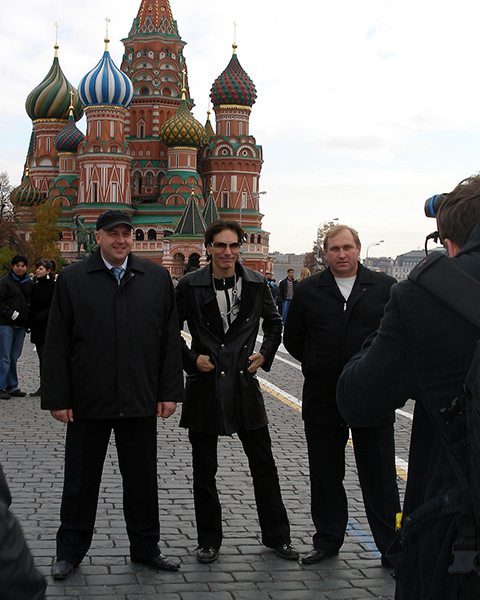 Steve Vai with fans on the Red Square in Moscow, Russia.
Steve Vai with fans on the Red Square in Moscow, Russia.
VB: Your live album Alive In Ultra World is very unusual in concept — it includes completely new compositions about individual countries, often recorded in that same countries. How did you come up with such idea?
SV: Whenever I think of a big job or project, I try to make something really unique for me. This also applies to my guitar playing, and the compositions themselves, and albums in general. When there was a time for me to record a real live album, I decided that working on it should be a kind of adventure. And I decided that, to begin with, only new pieces should be recorded on it — but even this decision did not seem radical enough to me.
The whole idea arose on the basis of a simple fact: when you go on a world tour, you constantly listen to the music of those countries where you have to perform — and it is unique to you. Everything is different there — the melodies and the construction of musical phrases, and even sound production... Naturally, a musician becomes interested: “Can I play like that?”
This is how the concept of Alive In Ultra World arose: to compose a truly folk piece for a rock band and play and record it in the same country, whose music I relied on when creating this number. To be honest, Alive In Ultra World is the most ambitious live album in the history of rock and roll. If such a concept at such an instrumental level were implemented by Sting, then everyone would say that he is a genius. But this album was recorded by one Steve Vai and his band, and therefore the audience remained indifferent.
I must admit that my live album is a combination of great music and the hard work of learning and recording it. Yes, I wrote new material during the tour — but it was just easy, and after writing the material followed the hardest six- or even eight-hour sound checks, in which the band learned these pieces. It was really brutal work — I am a polite person, but in that situation I had to command the musicians harshly: “Play this way, not that way, and learn your parts quickly!” It was very difficult for all of us — if you ask drummer Mike Mangini now about working on Alive In Ultra World, he will probably answer you: “Working on this album ruined my life!” But this always happens with the implementation of great ideas in life — this is a monstrously time-consuming process, and you always face a dilemma: to finish the work or to give up halfway. Sometimes I even fell into despair, but continued to work, and now I can honestly say to myself: I did it. I did a really interesting live album, not just a bunch of live versions of some studio numbers from my entire career.
VB: Everyone knows Steve Vai the guitarist, but few people know about Steve Vai the beekeeper. Does your beekeeping influence your guitar playing? Or vice versa: does playing the guitar affect the behavior of your bees? And how did you come to such an unusual hobby for a rock musician?
SV: My wife and I bought a house in California, but it had been in an abandoned state for about ten years, so the orchard that surrounded it was not viable — the trees simply did not bear fruit. Then I read in some magazine that bees pollinate such trees in the best way — well, I bought a couple of bee colonies along with the hives. And then it turned out that breeding bees is a very simple and natural matter, which does not burden you at all.
Bees can be practiced anywhere in the world, and in Moscow too. But for me, beekeeping is also a kind of emotional refuge from my music lessons, from my main job. I believe that every person needs such a shelter. In addition, I think that as a musician with somewhat eccentric inclinations, my hobby for beekeeping does not interfere in the least. After all, you will agree that bees are very natural living beings, real creatures of God. And I am very pleased to tinker with hives at least two weeks a year, and then extract honey from them and treat them to my friends. Probably, such a hobby leaves an imprint on my guitar playing. I think that journalists should hear this better than myself!
VB: How would you respond to those critics who say that Steve Vai is just an ultra-fast guitar player, whose technique is completely devoid of soul?
SV: What can I say — it's always nice to hear compliments, even from unpleasant people! I know that a lot of people like my speedy way of playing the guitar, and so do I myself. But for those who do not like it, I can only advise one thing — listen to my music more attentively, and you will find in it not only speed. If, of course, you have enough imagination to hear in it everything that I put into my own works.


